非谓语动词难点、易错点(1)
非谓语动词错误例析

非谓语动词错误例析(一)英语中的非谓语动词是高考的语言重点,是历届高考试题中的必考内容,也是中学生在校学习英语的过程中深感棘手的难点。
下面是学生经常出错的非谓语动词的一些例子。
【例1】W It took her two hours finishing her homework.R It took her two hours to finish her homework.【例2】W It is no use to regret what has been done.R It is no use regretting what has been done.【分析】不定式,动名词均可以用作句子的主语.其区别不大,常可互换.但在某些句型中的主语用动名词(例2),某些句型中主语永不定式(例1)都属于习惯用法,一般不宜互换。
【例3】W Most of the students enjoy to read novels.R Most of the students enjoy reading novels.【例4】W He always refuses doing what he is unwilling to.R He always refuses to do what he is unwilling to.【分析】不定式,动名词均可以作宾语。
但并非每个及物动词后都可以接不定式或者都能解动名词。
要根据各个动词的搭配结构选定不定式活动名词。
1. 某些动词后既可以接不定式又可以接动名词,其意义差别不大,可以互换。
这类动词有:like love hate dislike begin start continue 等。
例: She likes playing(to play ) chess in her spare time.Nobody can bear to be laughed (being laughed) at in public.2. 某些及物动词后只能接不定式作宾语,不能接动名词作宾语如(例4)。
非谓语动词的难点
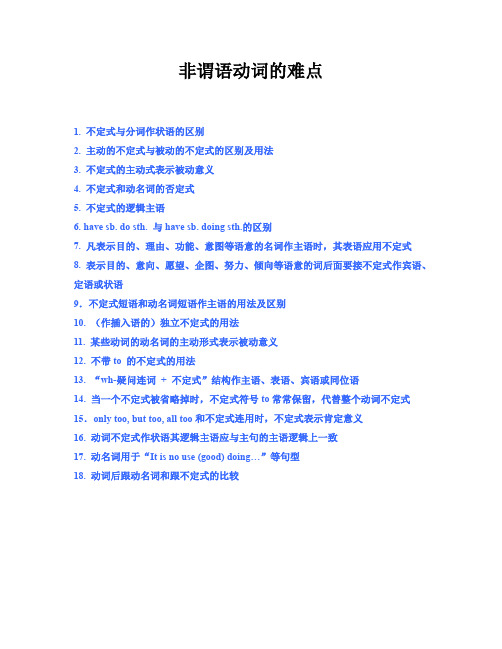
非谓语动词的难点1. 不定式与分词作状语的区别2. 主动的不定式与被动的不定式的区别及用法3. 不定式的主动式表示被动意义4. 不定式和动名词的否定式5. 不定式的逻辑主语6. have sb. do sth. 与have sb. doing sth.的区别7. 凡表示目的、理由、功能、意图等语意的名词作主语时,其表语应用不定式8. 表示目的、意向、愿望、企图、努力、倾向等语意的词后面要接不定式作宾语、定语或状语9.不定式短语和动名词短语作主语的用法及区别10. (作插入语的)独立不定式的用法11. 某些动词的动名词的主动形式表示被动意义12. 不带to 的不定式的用法13. “wh-疑问连词+ 不定式”结构作主语、表语、宾语或同位语14. 当一个不定式被省略掉时,不定式符号to常常保留,代替整个动词不定式15.only too, but too, all too和不定式连用时,不定式表示肯定意义16. 动词不定式作状语其逻辑主语应与主句的主语逻辑上一致17. 动名词用于“It is no use (good) doing…”等句型18. 动词后跟动名词和跟不定式的比较1. 不定式与分词作状语的区别不定式作状语时,只用来表示目的、原因和结果,其位置常常在被修饰词或句子的后面。
分词作状语时,可表示时间、原因、条件、让步、结果、目的、方式或伴随情况,其位置常常在被修饰词或句子的前面。
下面从两者都能充当的几种成分来看一下它们的区别。
1. 不定式与分词作状语的区别A. 作原因状语分词作原因状语时常位于句首或在主谓之间,在意义上相当于一个原因状语从句,强调这个原因。
不定式作原因状语时,常位于句子后面,主句中的谓语动词多是表示内心活动的词,其后的不定式说明他们产生的原因。
e.g. Being poor in health, he retired at the age of fifty.Lost in the strange city, poor Bill fell to cry.He seemed surprised to meet us.I’m happy to hear the news.B. 作结果状语分词作结果状语常由thus引起。
非谓语动词易错点盘点

非谓语动词易错点盘点作者:试题调研原创易错点1 意义相近的结构混用【典例1】 He was busy writing a story, only once in a while to smoke a cigarette.(2008·辽宁卷)A.to stopB.stoppingC.to have stoppedD.having stopped【错因分析】考生做本题时很容易受到思维定式的影响,误选A项。
平时我们最常见的是only to do sth.结构,例如:2005年全国高考英语广东卷中的题目"He hurried to the station only to find that the train had left." only to do sth.这种结构在句中作状语时,通常表示意外或不愿看到的结果,它所表达的事件往往是紧接着前面的事件发生的。
【纠错心得】 B。
分析句意可知,"only..."部分并不表示意外或不愿看到的结果。
实际上,"only..."部分在句中应作伴随状语,由于主句主语He与该横线处所填的非谓语动词之间为主谓关系,故选项B为本题的正确答案。
【典例2】 Oil prices have risen by 32 percent since the start of the year,a record $57.65 a barrel on April 4.A.have reachedB.reachingC.to reachD.to be breaking【错因分析】考生很容易误选C项,认为C项中to reach为动词不定式结构在句中作结果状语。
这可能是因为有很多考生没有完全掌握动词不定式结构与现在分词结构作结果状语时的差别。
【纠错心得】 B。
在英语中,带动词不定式符号to的动词不定式结构与现在分词结构都可以表示结果,但用法不同。
语法满分冲刺5:非谓语动词易错点总结(1)

非谓语动词易错点总结6.动名词和现在分词作定语的区别7.to be done, being done, done8.独立主格结构/with的复合结构易错点1:加不定式/动名词做宾语的动词+不定式做宾语的动词决心学会想希望,拒绝设法愿假装。
主动答应选计划,同意请求帮一帮。
decide/determine, learn, want, hope/wish/expect,既可接不定式,又可接动名词,但含义不同to do sth. 忘记去做某事doing sth. 忘记已经做过某事to do sth. 记得去做某事doing sth. 记得曾经做过某事forget remember易错点2:动词不定式主动表被动的形式2种结构几种感觉2种关系2个短语to blame 受责备例: Who is to blame There are several houses to rent.2个短语不定式与被修饰成分间构成动宾关系,同时还跟不定式的逻辑主语构成主谓关系。
例: She has a baby to look after.2种关系with 复合结构中,不定式用主动表被动例: With a lot of questions to answer, Mr. Zhang didn’t go home last night.2种结构(1)在几个表示感觉的形容词后做状语,常用主动形式表示被动含义。
如: easy, difficult, hard, interesting, comfortable, soft, 几种感觉高考常考点:⑴“有事要做”结构I have something to do .⑵“问题好答”结构易错点3:见to不一定是不定式,也可能是介词(1) look forward to doing 盼望做某事(2) be/get used to doing 习惯于做某事(3) be/get accustomed to doing 习惯于做某事易错点4:动名词的复合结构动名词前可加逻辑主语构成复合结构物主代词(如his, my)名词所有格(如Jack’s)易错点5:常用的系表结构be seated 坐在be/get lost 迷失be/get stuck 卡住,陷入be/get married 结婚斐斐点睛非谓语动词易错点(一)1.加不定式/动名词做宾语的动词2.动词不定式主动表被动的形式(不定式动作的承受者和执行者)。
非谓语动词重难点,一篇全搞定,高中三年不用愁!

非谓语动词重难点,一篇全搞定,高中三年不用愁!非谓语动词属于英语语法的三座大山之一,无论在考试中还是平时的英语阅读中所起的作用都举足轻重。
但是,对于这么重要的语法内容,很多同学们却怎么学都学不透,要么完全不懂、做题时全靠“感觉”;要么一知半解,能跳过则跳过。
其实,只要方法正确,遇到有关非谓语动词的题目时就会迎刃而解,更令人开心的是,在平时的英语阅读中再也不需要绕道而行了!非谓语动词的含义非谓语动词首先是一种动词形式,其次是这种动词形式不能做谓语,综合这两点,我们将其叫做非谓语动词。
非谓语动词的形式非谓语动词包含四种形式,即不定式、动名词、现在分词和过去分词。
其中,每种形式按照发生时间和主被动又包括不同的子形式。
具体如下:1. 不定式①基本形式:to do(表示主动,并且一般表示将来)②被动式:to be done(表示被动,并且一般表示将来)③进行式:to be doing (表示主动和进行)④完成时:to have done(表示主动和完成)⑤完成被动式:to have been done(表示被动和完成)⑥完成进行式:to have been doing (表示主动和完成进行)例如:The teacher told us to do morning exercises .老师让我们做早操。
The car to be bought is for his sister.要买的这辆车是给他的姐姐的。
She pretended to be reading when the teacher came into the classroom.老师进来时,她假装正在读书。
The thief is said to have escaped.据说小偷已经逃跑了。
The thief is said to have been arrested.据说小偷已经被抓住了。
She is said to have been working in the factory over the last 20 years.据说在过去的20年里,她一直在这家工厂工作。
非谓语动词(六)

英语:动词的非谓语形式【重点难点提示】一、重点是:1 .动词不定式(1)动词不定式的构成为:“to + 动词原形〞(有时可不带to)。
动词不定式没有人称和数和的变化。
(2)动词不定式既有名词的特性,又有动词的特性,它可以有自己的宾语和状语。
它在句中可充当主语、宾语、表语、定语、状语和补足语。
2 .动词ing形式的用法。
3 .动词过去分词的用法。
二、难点是:(1)在有些动词后动词不定式作宾语补足语时不带to。
(2)有些动词后只能接动词不定式作宾语。
(3)有些动词后只能接动词ing形式(即动名词)作宾语。
(4)有些动词后既可接动词不定式作宾语,也可接动词ing形式作宾语,但意思不同。
【同步达纲练习】Ⅰ .用括号中所给动词的适当形式填空。
1 .Bill lives in a place called (call) Gum Tree .2 .Let him have (have) a good rest .3 .Li Ping made the baby laugh (laugh) at last .4 .Miss Gao wants to take (take) these books to the classroom now .5 .She is ill .So she had better stay (stay) in bed for a few days .6 .You’d better not look (not ,look) out of the window in class .7 .It was very nice to play (play) with you .8 .They wake up their parents , called (call) :“Merry Christmas !〞9 .A lot of good land has gone with them ,(leave) only sand .10 .There was a fire (burn) in the fireplace .11 .The policeman told the boys (not ,play) football near the road .12 .Why not (go) to the park with us tomorrow ?13 .We’re free now .How about (fly) kites ?14 .We often hear our English teacher (sing) English songs .15 .One day ,his father saw him (sit) on some eggs .16 .Mr Wu have watched us (play) basketball for half an hour .17 .This morning I kept on (think) about the Christmas party this evening .18 .A lot of English people are good at (boat) .19 .We’re very thirsty .Let’s stop (drink) some water .20 .When the two boys saw the teacher ,they stopped (fight) at once .21 .Kate is a little ill .She doesn’t feel like (eat) anything these days .22 .In the old days ,the workers were made (work) more than 16 hours a day .23 .Have you finished (do) your homework yet ?24 .The heavy snow stopped many people from (go) to work .25 .Mary found a watch (lie) on the road on her way to school .26 .Do you like (fish) ?Yes .But I don’t like (fish) now .27 .Thank you for (lend) it to me .28 .Jim and his parents enjoy (live) in China very much .29 .—Do you mind my (smoke) here ?—Yes ,but I do .30 .—Would you like (e) to my birthday party this evening ?—Certainly .I’ll be glad to .31 .Don’t spend too much time (watch) TV .32 .The farmers are busy (get) ready for the next year .33 .We’re going to do some (shop) this Sunday .34 .—Shall we go (skate) tomorrow ?—That’s a good idea .35 .In England ,the first name is the (give) name .36 .Do you know another way of (say) the word ?37 .(take) a walk after supper is good for our health .38 .He quickly got up and went on (run) .39 .Sorry ,I have a lot of work (do) today .40 .It’s very kind of you (help) us .41 .It’s much better (give) than (receive) .42 .I don’t know what (do) next .43 .She’ll read a book tonight instead of (see) a film .44 .England is a (develop) country and India is a (develop) one .45 .That pot was used for (keep) tea hot after it was made .46 .I remember (tell) you the story before .47 .Take the second (turn) on the right .48 .The boy can’t get (dress) himself .49 .Don’t forget (lock) the door when you leave .50 .She’ll try her best (catch) up with the class .参考答案【同步达纲练习】Ⅰ .1 .called 2 .have 3 .laugh 4 .to take 5 .stay 6 .not look 7 .to play8 .calling 9 .leaving 10 .burning 11 .not to play 12 .go 13 .flying 14 .sing15 .sitting 16 .play 17 .thinking 18 .boating 19 .to drink 20 .fighting 21 .eating 22 .to work 23 .doing 24 .going 25 .lying 26 .fishing ,to fish 27 .lending28 .living 29 .smoking 30 .to e 31 .watching 32 .getting 33 .skating 34 . skating 35 .given 36 .saying 37 .Taking 38 .running 39 .to do 40 .to help 41 .to give ,to receive 42 .to do 43 .seeing 44 .developed ,developing 45 .keeping 46 .telling 47 .turning 48 .dressed 49 .to lock 50 .to catch非谓语动词专项练习题一、用所给动词适当形式填空:A . ① I want one magazine ______ . ( read )② My teacher wanted me ______ this question . ( answer )③ The woman wanted her husband ______ at once . ( examine )④ My bicycle wants _______ . ( repair )B . ① What made you ______ so ? ( think )② The girl was made _____ a man she didn`t love at all . ( marry )③ The show made me _______ in the study of science . ( interest )④ He raised the picture to make everyone _______ clearly . ( see )⑤ He raised his voice to make himself _______ . ( hear )⑥ My father himself made some candles _______ light . ( give )⑦ The boss made the workers _______ day and night . ( work )C . ① You`d better get your own room _______ . ( clean )② Yesterday he got his wallet _______ . ( steal )③ You should get your friends _______ you . ( help )④ The lecture got us _______ . ( think )⑤ Don`t get ________ in the rain . ( catch )D . ① Did you see somebody _______ into the room ? ( steal )② I saw him _______ in the room at that time . ( read )③ She was glad to see her child ________ good care of . ( take )④ I saw her _______ at the windows , thinking . ( seat )⑤ She was seen ________ here . ( e )E . ① I like _______ very much . ( swim )② I don`t like _______ TV at this time . ( watch )③ He never likes _______ at the meeting . ( praise )④ I feel like _______ to the cinema . ( go )⑤ Would you like ______ with me ? ( go )F . ① The man ______ at the meeting now is from the south . ( speak )② I don`t know the professor ______ at the meeting tomorrow . ( speak )③ He is the professor _______ to dinner . ( invite )G . ① It was so cold and he had the fire _______ all night long . ( burn )② I have a lot of exercises ________ today . ( do )③ "Do you have nay clothes _______ today ? "asked Mother . ( wash )④ You`d better have that bad tooth _______ out . ( pull )⑤ I want to have him _______ a car for me . ( find )H . ① He doesn`t do anything but _______ all day . ( play )② We have no choice but _______ . ( obey )③ I`m thinking of how _______ my English . ( improve )④ He made an apology for _____ late . ( be )I . ① He told us about his trip in an _______ voice . ( excite )② He told us his story in a _______ voice . ( tremble )③ At the sight of a snake , the little girl was very _______ . ( frighten )④ The boy was _______ , so I didn`t believe him again . ( disappoint )J . ① He is looking forward to ______ college . ( enter )② He is looking forward to _____ nothing . ( see )K . ① When he heard the news , he couldn`t help ________ with joy . (jump)② I couldn`t help ______ by the beauty of nature . ( strike )③ Sorry , I can`t help ______ the housework today . ( do )L . ①______ enough time , we`ll do it better . ( give )②______ a candle , he went on reading . ( light )③______ from the hill , the park looks more beautiful . ( see )④______ the people well , we must work hard at our lessons . ( serve )二、单项选择:〔1〕1. Saying always has less difficulty than _____.A. doneB. doingC. to doD. having done2. The girl is seriously ill. There is _____.A. nothing to do but send for a doctorB. something to do but to send for a doctorC. nothing to do but to send for a doctorD. anything to do but sending for a doctor3. The rest of the money _____ to Alice.A. is to sendB. are to sendC. is to be sentD. are to be sent4. Although swimming is his favorite sport, yet he doesn’t like _____ t oday.A. to swimB. swimmingC. swimD. to have swim5. She said she was sorry _____ the train, so she had to stay here for another day.A. missingB. having missedC. to missD. to have missed6. _____ the same mistake again made his parents very angry.A. His being madeB. He has madeC. He had makingD. His making7. I find the man hard _____.A. to be pleasedB. pleasingC. pleasedD. to please8. You’d better not have t he lights _____ all day long.A. burningB. burnedC. to burnD. being burnt9. It is _____ thinking about it now.A. of no useB. not useC. no useD. not of any uses10. —Would you like to sing a song for us?—_____.A. I prefer notB. I prefer not toC. I prefer to notD. I wouldn’t prefer11. He insisted _____ the working site.A. to be sent toB. being sent toC. on being sent toD. that to be sent to12. During the next ten years, she had to work hard _____ for the necklace.A. payingB. to payC. for payingD. in order to paying13. Janet was angry at _____.A. my not waiting for herB. I didn’t wait for herC. me not wait for herD. me to not wait for her14. I prefer staying at home _____ the theater.A. to go toB. for going toC. to going toD. rather than go15. Please get someone _____ the washing machine. I want to get it _____ as soon as possible.A. to repair/to be repairedB. repair/repairedC. to repair/repairingD. to repair/repaired16. _____ more time, he could have done the work much better.A. To be givenB. To giveC. GivenD. Giving17. The information _____ to us is of great value.A. broughtB. takenC. being takenD. being carried18. The building _____ next month will be a modern hospital.A. builtB. being builtC. to be builtD. be built19. Jessie was sick _____ such noise.A. of hearingB. to hearC. of being heardD. heard20. _____, he left the room.A. Finishing the workB. Had finished the workC. After finished the workD. Having finished the work21. _____ afraid _____ behind, Bill studied even harder than ever before.A. To be/of fallingB. Being/fallC. Being/of fallingD. To be/to fall22. The machine requires _____, so the workers are required _____ ready.A. repair/to getB. repairing/to getC. repairing/gettingD. to be repaired/getting23. Everyone dislikes _____.A. being laughedB. to be laughedC. being laughed atD. to be laughed at24. Would you like Helen _____ you since you have some difficulty?A. helpingB. to helpC. has helpedD. help25. He is beginning _____ his mistakes.A. correctB. to correctC. correctingD. corrected26. The Americans can’t use chopsticks _____.A. to eatB. to eatingC. eatingD. to eat with27. My wish is _____ the people well in the future.A. to serve forB. to serveC. servingD. serving for28. The poor boy, _____ with extraordinary strength, _____ from the ground.A. filled/roseB. filling/roseC. full/raisedD. filled/risen29. Most shops are open every day, Sunday _____.A. includingB. includedC. being includedD. to include30. _____ hot, he left only his stomach _____ with a piece of cloth.A. Feeling/coveringB. Feeling/coveredC. Felt/coveredD. Felt/covering31. He advised _____ a meeting _____ the problem.A. holding/to discussB. holding/for discussingC. to hold/to discussD. hold/discussing32. _____ the teacher, and he will tell you the answer.A. AskingB. AskC. If askD. If you ask33. The thief entered the room without _____.A. noticingB. being noticedC. having noticedD. having been noticed34. I happened _____ the story when she told me about it.A. having heard ofB. to have heard ofC. to be heard ofD. to hear of35. He is said _____ abroad already.A. having sentB. to be sendingC. to have been sentD. being sent36. He was made _____ working because of his poor health.A. stoppingB. to stopC. stoppedD. stop37. Do you consider it any good _____ again?A. to tryB. tryC. tryingD. for you to try38. I regret _____ you that we are unable to offer you a job.A. informingB. having informedC. to informD. to informing39. I would appreciate _____ back this afternoon.A. you to callB. you callC. your callingD. you’re calling40. She admitted _____ the key.A. being takingB. to takeC. having takenD. to have taken41. Besides _____, she is kind and tender.A. beautifulB. being beautifulC. she beautifulD. is beautiful42. I don’t want to speak to you, but I _____.A. have to speakB. have toC. must speakD. must43. I wondered whether the movie was _____ worth _____.A. very/seeingB. well/being seenC. very/being seenD. well/seeing44. The lecturer began by _____ us where the island was, and went on _____ about its history.A. telling/talkingB. to tell/to talkC. telling/to talkD. he told/talking45. After seeing the movie, _____.A. the book was read by himB. the book made him want to read itC. he wanted to read the bookD. the reading of the book interested him46. —Why doesn’t he take notes?—He has no pen _____. He seems _____ it.A. to write/to forget bringingB. to write with/to forget to bringC. to use with/to have forgotten to bringD. to write with/to have forgotten to bring47. When _____, water can be changed into vapor.A. heatedB. being heatedC. having been heatedD. to heat48. Having finished the work, _____.A. it was almost six o’clockB. a postman came and delivered the evening paper and some lettersC. supper had already been preparedD. we had a rest and then had supper49. _____, she felt quite shy at the party.A. As she a strangerB. Being a strangerC. According to a strangerD. She was a stranger50. Flank went to the swimming pool _____ swimming.A. to goB. goneC. goingD. go51. The _____ girl sat in the corner, crying.A. frightenB. frightenedC. frighteningD. fright52. On a _____ morning the little match girl was found _____ at the corner ofthe street.A. freezing/freezingB. freezing/frozenC. frozen/frozenD. frozen/freezing53. They found a _____ old man _____ on the ground when the door was broken open.A. dying/lyingB. dying/liedC. dead/liedD. dead/lain54. Be quick, or you’ll get _____ in the rain.A. to be caughtB. catchingC. to catchD. caught55. Who could have imagined such a sweet-tempered girl as Jane _____ such a thing!A. doingB. to doC. will doD. does56. He told me not to leave the pot _____.A. uncoveredB. to uncoverC. to be uncoveredD. uncovering57. The experience made him _____ the study of science.A. interest inB. to interest inC. interesting inD. interested in58. He managed to make himself _____ with his _____ English.A. understood/breakingB. understood/brokenC. understand/breakingD. understand/broken59. Did you hear the sound like that of a door _____?A. burstB. to burst inC. burst inD. to be burst in60. I was deep in thought, so I didn’t notice _____.A. him to e inB. him e inC. he e inD. him ing in61. Have you any objection to _____ there on foot?A. be goingB. goingC. goD. went62. The wallet was returned to him without anything _____.A. missedB. to be missedC. missingD. to miss63. The teacher was far from _____ with the result of the exam.A. satisfyB. satisfiedC. being satisfiedD. satisfying64. Hurry up! Mother is sure _____ us at home.A. waitingB. to wait forC. to be waitingD. to be waiting for65. Mr Brown is said _____ a new novel.A. to writingB. to have been writtenC. to be writtenD. to have written66. When _____ into a warm room, the ice soon changed to water.A. to takeB. to be takenC. takingD. taken67. The old man walked in the street _____.A. followed his sonB. and following his sonC. and followed by his sonD. followed by his son68. _____ with fear, a hungry fox hid himself in a small cave, _____ his tail to the rain.A. Trembling/exposingB. Trembled/exposedC. Trembled/exposingD. Trembling/exposed69. The two farmers _____ what appeared to be small guns forced the enemy officer to hand in his map.A. carriedB. were carryingC. carryingD. had carried70. Six _____ nine makes fifteen.A. added toB. adds toC. added up toD. added by71. The lecturer _____ will be here tomorrow.A. to talk about so muchB. to be talking about so muchC. so much talking aboutD. so much talked about72. _____ some of the questions _____, the Premier said goodbye to us.A. Left/unansweredB. Leaving/unansweredC. Leaving/unanswerD. Left/unanswer73. _____ her mother had e, her face lit up.A. HearingB. Having heardC. When heardD. When she heard74. _____ in white, she looks much more beautiful.A. WearingB. DressingC. DressedD. Having dressed75. _____, the boy couldn’t enter his house.A. Since the key had lostB. The key being lostC. Lost the keyD. Having lost the key76. The Arctic is considered _____ the northern part of the Atlantic.A. having beenB. to have beenC. to beD. being77. It is impossible for the work _____ within a month.A. finishingB. being finishingC. to finishD. to be finished78. I am too glad _____ you.A. to seeB. seeingC. sawD. at seeing79. There is _____ what the weather will be like.A. not knowingB. no knowingC. not knowD. no known80. The bottle _____ the poison was sent to the laboratory for a test.A. containingB. containedC. which containingD. which is contained81. _____ the children, we are all sure everything will be all right.A. With him taken care ofB. With he taken care ofC. With him taking care ofD. With he taking care of82. At first she wanted to go to the cinema, but on second thoughts she decidedit would be better _____ at home and _____.A. stay/workB. to stay/to workC. stay/to workD. to stay/work83. He didn’t speak to me, let alone _____ me.A. helpB. to helpC. helpingD. helped84. The people’s government does its best to have the living standard of the people _____.A. risenB. raisedC. riseD. raise85. The little girl found her teddy bear _____ under the bed.A. hidingB. to hide86. Mr Smith is _____ to our English evening.A. more pleased than to eB. more pleased to e thanC. more than pleased to eD. more pleasing than to e87. Once _____, a bad habit is rather difficult to get rid of.A. formedB. to be formedC. formingD. having formed88. You can have no idea what is _____ to do when you e to see the strange boss.A. orderingB. being orderedC. to orderD. to be ordered89. The noise of the door _____ the baby.A. closing wakenB. to close wokeC. closed wakeD. being closed woke90. Please leave a window _____, for it’s too hot.A. openB. openingC. to openD. opened91. _____ not knowing the answer to such an easy question!A. HopeB. DecideC. ImagineD. Think92. He asked to be kept _____ about developments.A. informingB. informedC. to informD. inform93. _____ everywhere, the wolves had nowhere _____ themselves.A. Hunting/to hideB. To hunt/to hideC. Hunted/hidingD. Hunted/to hide94. It _____ this way.A. used to doB. used to be doneC. is used to doingD. is using to do95. They have a lot of difficulty _____.A. in overingB. to overe it96. Didn’t you forget us _____ together in the countryside?A. to workB. to workingC. workingD. worked97. You always hear about planes _____ because of technical faults.A. having been delayedB. being delayedC. having delayedD. delaying98. These are needed for _____ clothes, paper and other necessaries.A. the making ofB. making ofC. to makeD. makings99. Have the police caught _____ yet?A. the prisoner who escapesB. the escaping prisonerC. the escaped prisonerD. the prisoner have escaped100. Do you still remember _____ you when you stayed in hospital?A. my mother and me visitingB. my mother’s and my visitingC. my mother and me to visitD. my mother and me to have visited三、单项选择〔2〕1. There ______ no classes yesterday, we paid a visit to the Great Wall.A. wasB. beingC. wereD. had been2. The policeman rushed into the room only ______ an old lady lying on the ground.A. foundB. findC. findingD. to find3. The boy lay on the ground, his eyes ______ and his hands ______.A. closing; tremblingB. closed; tremblingC. closed; trembledD. closing; trembled4.______, the girls raced on to the second runners.A. Stick in handB. With a stick in her handC. Sticks in handD. Sticks in hands5. Each of them got up early ______ to catch the early bus.A. to hopeB. hopingC. so thatD. and6. How pleased the Emperor was ______ what the cheats said!A. hearingB. heardC. hearD. to hear7. We should prevent pollution ______ happily.A. from livingB. livingC. to livingD. to live8.I am busy now, so I can’t help ______ the machine.A. repairB. to have repairedC. repairingD. fixing9. Jane came very close ______ a gold medal for Britain in the Olympics.A. to winB. winningC. to winningD. to be won10. The boy seated himself in the corner with his back ______ to his father.A. turningB. to turnC. to be turnedD. turned11. ----By the way, when did you get your bedroom ______?----Last week.A. to paintB. paintedC. paintingD. to be painted12. He likes ______, but he doesn’t like ______ today because it is too cold.A. to swim; to swimB. swimming; swimmingC. to swim; swimmingD. swimming; to swim13. There is ______ what the weather will be like.A. not knowingB. no knowingC. not knowD. no known14. The novel is said ______ into many languages.A. to translateB. being translatedC. to have been translatedD. having been translated15. I’m examining the position he has just finished ______ the possible mistakes in it.A. correctingB. to correctC. correctedD. correct16. They would not allow him ______ across the enemy line.A. to risk goingB. risking to goC. for risk to goD. risk going17. He spent as much time as he could _____ the child.A. teachingB. to teachC. teachD. for teaching18. ----Alice, why didn’t you e yesterday?----I ______, but I had an unexpected visitor.A. hadB. wouldC. was going toD. did19. How pleased the Emperor was ______ what the cheats said!A. hearingB. to hearC. heardD. hear20. ______ the room, a letter was laid on the ground.A. EnteringB. Having enteredC. He enteredD. Mrs Green entering21. They set out ______ for the ______ boy.A. searching; losingB. searching; lostC. to search; lostD. to search; missed22. ______ her mother had e, her face lit up.A. HearingB. Having heardC. When hearingD. When she heard23. They arrived at their university very late, ______ the gate closely shut.A. foundB. to findC. findD. finding24. ----Do you have anything more ______, sir?----No. You can have a rest or do something else.A. typingB. to be typedC. typedD. to type25. The manager promised to keep me ______ of how our business was going on.A. to be informedB. on informingC. informedD. informing26. With a lot of difficult problems ______, the manager felt worried all the time.A. to settleB. settlingC. settledD. being settled27. Will those ______ the children from abroad e to the headmaster’s office?A. teachingB. teachC. who teachesD. who teaching28. After ______ for the job, you will be required to take a language test.A. being interviewedB. interviewedC. interviewingD. having interviewed29. They apologized for ______ to attend the meeting.A. their not being ableB. their being not ableC. them not ableD. them being able not30. They would not allow him ______ across the enemy line.A. to risk goingB. risking to goC. for risk to goD. risk going31. ______ to nuclear radiation, even for a short time, may produce variants(变异体) of genes in human bodies.A. Being exposedB. Having exposedC. ExposedD. After being exposed32. China became the 143rd member of the World Trade Organization on December 11, 2001, thus ______ its 15-year wish to join the global trade body.A. having realizedB. realizedC. realizingD. to realize33. Tom looked at Jenny, tears ______ his eyes, and shouted out the words ______ in his heart for years.A. filling; having hiddenB. filled; hiddenC. filling; hiddenD. filled; hiding34. They apologized for ______ to attend the meeting.A. their not being ableB. their being not ableC. them not ableD. them being able not35. Which will you enjoy ______ your vacation, traveling abroad or working in the countryside?A. to spendB. spendC. spendingD. spent36. ----Will you please tell us how you can seize the robbers?----I will spend a whole week ______ in your room to wait for their ing.A. lockingB. to lockC. lockedD. being locked37. I regret ______ you that they are unable to e to your wedding tomorrow.A. informingB. having informedC. to have been informedD. to inform38. He wondered if he could slip out of the lecture hall without anyone ______.A. noticingB. noticedC. to noticeD. being noticed39. After ______ for the job, you will be required to take a language test.A. being interviewedB. interviewedC. interviewingD. having interviewed40. He spoke in such a high voice ______ out in the street.A. as to be heardB. to be heardC. as to hearD. to hear41. As early as 1647 Ohio made a decision that free, tax-supported schools must be set up in every town ______ 50 households or more.A. havingB. to haveC. to have hadD. having had42. The building project ______ next year is, I think, not easy ______ in time.A. being carried out; to pleteB. carried out; to be pletedC. to be carried out; to pleteD. to be carried out; to be pleted43. The reason ______ she gave for not ing to the party is that her mother wouldn’t allow her to.A. thatB. whatC. whyD. because44. Excuse me, could you tell me how to get to the Grand Hotel? I thought it was on this corner, but I seem to ______ a mistake.A. makeB. be makingC. having madeD. have made45. ----Here’s a new pair of shoes for you.----Thank you, but there’s no need ______ a new pair for me.A. to have boughtB. to buyC. buyingD. to be buying46. What worried the boy most was ______ to visit his father in the hospital.A. his not allowingB. his not being allowedC. having not been allowedD. his being not allowed47. To do a bit for the motherland, ______.A. working hard is necessaryB. to learn a foreign language is neededC. it is important to master scienceD. one should serve the people whole-heartedly48. Everything ______ into consideration, they ought to have another chance.A. to takeB. takenC. to be takenD. taking49. The officials discussed the plan that they would like to see ______ the next month.A. carry outB. carrying outC. to carry outD. carried out50. With a lot of difficult problems ______, the manager felt worried all the time.A. to settleB. settlingC. settledD. being settled51. ----Do you have anything more ______, sir?----No, you can have a rest or do something else.。
【中考英语 易错题】易错点07 非谓语动词(解析版)
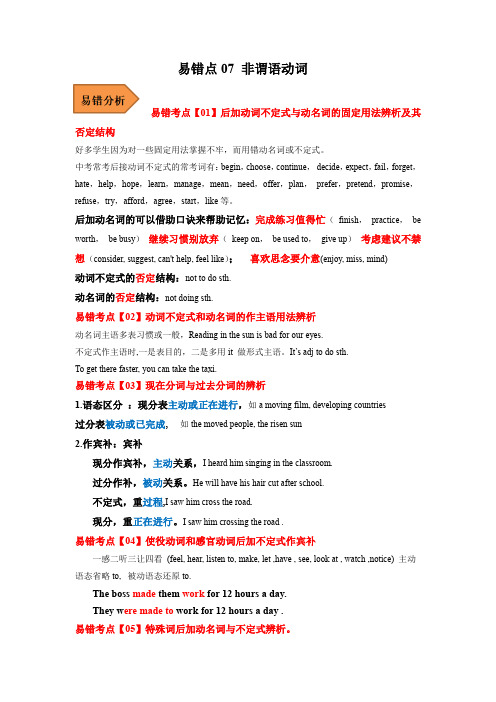
易错点07 非谓语动词易错考点【01】后加动词不定式与动名词的固定用法辨析及其否定结构好多学生因为对一些固定用法掌握不牢,而用错动名词或不定式。
中考常考后接动词不定式的常考词有:begin,choose,continue,decide,expect,fail,forget,hate,help,hope,learn,manage,mean,need,offer,plan,prefer,pretend,promise,refuse,try,afford,agree,start,like等。
后加动名词的可以借助口诀来帮助记忆:完成练习值得忙(finish,practice,be worth,be busy)继续习惯别放弃(keep on,be used to,give up)考虑建议不禁想(consider, suggest, can't help, feel like);喜欢思念要介意(enjoy, miss, mind)动词不定式的否定结构:not to do sth.动名词的否定结构:not doing sth.易错考点【02】动词不定式和动名词的作主语用法辨析动名词主语多表习惯或一般,Reading in the sun is bad for our eyes.不定式作主语时,一是表目的,二是多用it 做形式主语。
It’s adj to do sth.To get there faster, you can take the taxi.易错考点【03】现在分词与过去分词的辨析1.语态区分:现分表主动或正在进行,如a moving film, developing countries过分表被动或已完成,如the moved people, the risen sun2.作宾补:宾补现分作宾补,主动关系,I heard him singing in the classroom.过分作补,被动关系。
高三英语最困难考点系列高三最困难考点系列(1)非谓语动词 含解析

高三最困难考点系列(1)非谓语动词非谓语动词★★★★★○○○○○【命题说明】非谓语动词是高考命题中最难的考点之一,非谓语动词的命题形式灵活多样,正确判断和使用动词的形式是非谓语动词主要的命题形式。
非谓语动词主要以语法填空、短文改错、单项填空的形式进行考查.高考范文中含有非谓语动词的句子也是判断高级句型的体现。
非谓语动词的核心考点1.非谓语动词作状语(1)不定式作状语①表示目的I stopped the car to take a short break as I was feeling tired。
②不定式作结果状语表示出乎意料的结果,动词不定式前常加only。
George returned after the war,only to be told that his wife had left him。
(2)现在分词作状语①一般式doing表示动作和谓语动作同时或几乎同时发生,与句子的主语是主动关系.The sun began to rise in the sky,bathing the mountain in golden light。
(主动关系)②完成式having done表示动作发生在谓语动作之前。
I got to the office earlier that day,having caught the 7:30 train from Paddington。
③被动式having been done表示动作发生在谓语动作之前,与句子的主语是被动关系. Having been asked to work overtime that evening,I missed a wonderful film.(被动意义,非谓语动词的动作发生在谓语动词动作之前)(3)过去分词作状语过去分词作状语时,与句子主语之间是被动关系。
Seen from the top of the mountain,the city is very beautiful。
非谓语动词考点及易错点
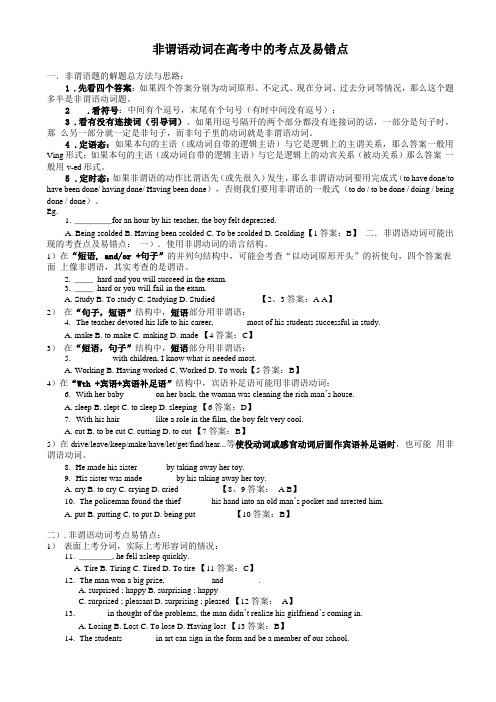
非谓语动词在高考中的考点及易错点一.非谓语题的解题总方法与思路:1.先看四个答案:如果四个答案分别为动词原形、不定式、现在分词、过去分词等情况,那么这个题多半是非谓语动词题。
2.看符号:中间有个逗号,末尾有个句号(有时中间没有逗号);3.看有没有连接词(引导词)。
如果用逗号隔开的两个部分都没有连接词的话,一部分是句子时,那么另一部分就一定是非句子,而非句子里的动词就是非谓语动词。
4.定语态:如果本句的主语(或动词自带的逻辑主语)与它是逻辑上的主谓关系,那么答案一般用Ving形式;如果本句的主语(或动词自带的逻辑主语)与它是逻辑上的动宾关系(被动关系)那么答案一般用v-ed形式。
5.定时态:如果非谓语的动作比谓语先(或先很久)发生,那么非谓语动词要用完成式(to have done/to have been done/ having done/ Having been done),否则我们要用非谓语的一般式(to do / to be done / doing / being done / done)。
Eg.1. ________ f or an hour by his teacher, the boy felt depressed.A. Being scoldedB. Having been scoldedC. To be scoldedD. Scolding【1 答案:B】二.非谓语动词可能出现的考查点及易错点:一).使用非谓动词的语言结构。
1)在“短语, and/or +句子”的并列句结构中,可能会考查“以动词原形开头”的祈使句,四个答案表面上像非谓语,其实考查的是谓语。
2.____ hard and you will succeed in the exam.3.____ hard or you will fail in the exam.A. StudyB. To studyC. StudyingD. Studied 【2、3 答案:A A】2)在“句子,短语”结构中,短语部分用非谓语:4.The teacher devoted his life to his career, ______ most of his students successful in study.A. makeB. to makeC. makingD. made 【4 答案:C】3)在“短语,句子”结构中,短语部分用非谓语:5._______ with children, I know what is needed most.A. WorkingB. Having workedC. WorkedD. To work【5 答案:B】4)在“Wth +宾语+宾语补足语”结构中,宾语补足语可能用非谓语动词:6.With her baby _______ o n her back, the woman was cleaning the rich man’s house.A. sleepB. sleptC. to sleepD. sleeping 【6 答案:D】7.With his hair ________ l ike a role in the film, the boy felt very cool.A. cutB. to be cutC. cuttingD. to cut 【7 答案:B】5)在drive/leave/keep/make/have/let/get/find/hear...等使役动词或感官动词后面作宾语补足语时,也可能用非谓语动词。
非谓语动词难点讲解

一、语法讲解(一)主谓关系和动宾关系主谓关系中心词与不定式所表示的动作之间具有逻辑上的主谓关系,即中心词是不定式动作的发出者。
如:She is always the first to come to school. 句中的the first 是come to school的逻辑主语,即这个动作的发出者。
动宾关系广义的讲,所谓宾语,它可以少掉主语却不可以没有动词,也就是说宾语是依附于动词而存在的,只要是动词涉及到的对象,我们就可以说该对象与动词之间是动宾关系。
因此动宾关系可以出现在各种情况,如:1. 直接跟在动词后面2. 出现在被动语态中,如:The movie has been shown many times. 这部电影多次被放映。
(movie 与shown 是动宾关系)3. 出现在非谓语动词中,如:You must have the question confirmed.. 你必须得(让人)确认这个问题。
(即问题被确认,question 与confirmed 是动宾关系)Anna was reading a piece of science fiction, completely lost to the outside world.安娜正在看一部科幻小说,对外面的事情一无所知。
(句子 a piece of science fiction与过去分词lost 是动宾关系)1. Following a dog, the hunter appeared.猎人出现了,前面走着一只狗。
2. The hunter appeared, followed by a dog.猎人出现了,后边跟着一只狗。
句1中,现在分词短语作状语,与句子主语形成逻辑上的主谓关系,即:The hunter followed a dog.。
句2中,过去分词短语作状语,与句子主语存在逻辑上的动宾关系,即:The hunter was followed by a dog.再如:3. Seen from space, the earth looks blue.从太空上看,地球是蔚蓝一片。
英语非谓语重难点考点总结
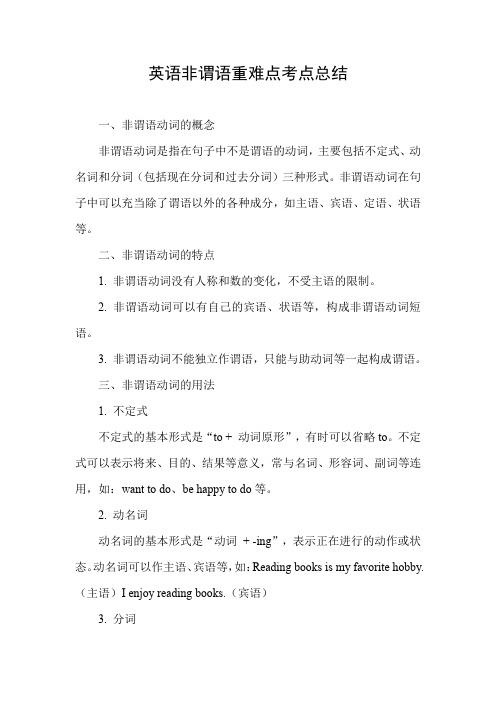
英语非谓语重难点考点总结一、非谓语动词的概念非谓语动词是指在句子中不是谓语的动词,主要包括不定式、动名词和分词(包括现在分词和过去分词)三种形式。
非谓语动词在句子中可以充当除了谓语以外的各种成分,如主语、宾语、定语、状语等。
二、非谓语动词的特点1. 非谓语动词没有人称和数的变化,不受主语的限制。
2. 非谓语动词可以有自己的宾语、状语等,构成非谓语动词短语。
3. 非谓语动词不能独立作谓语,只能与助动词等一起构成谓语。
三、非谓语动词的用法1. 不定式不定式的基本形式是“to + 动词原形”,有时可以省略to。
不定式可以表示将来、目的、结果等意义,常与名词、形容词、副词等连用,如:want to do、be happy to do等。
2. 动名词动名词的基本形式是“动词+ -ing”,表示正在进行的动作或状态。
动名词可以作主语、宾语等,如:Reading books is my favorite hobby.(主语)I enjoy reading books.(宾语)3. 分词分词分为现在分词和过去分词两种形式。
现在分词的基本形式是“动词+ -ing”,表示正在进行的动作或状态;过去分词的基本形式是“动词+ -ed”,表示已经完成的状态或动作。
分词可以作定语、状语等,如:the exciting match(定语)、the match finished at 8:00(状语)。
四、非谓语动词的难点考点1. 非谓语动词作主语的判断非谓语动词作主语时,主要判断该句子缺什么成分,如果缺主语,就可以考虑使用动名词或不定式。
例如:____(see)is believing. 这句话缺少主语,可以使用动名词或不定式,但根据句意“眼见为实”,应该使用动名词。
2. 非谓语动词作宾语的判断非谓语动词作宾语时,主要判断该动作与句子主语的关系。
如果该动作是句子主语的主动行为,则使用不定式;如果该动作是句子主语的被动行为,则使用动名词。
人教版英语非谓语动词难点、易错点含答案解析

人教版英语非谓语动词难点、易错点含答案解析一、非谓语动词1.—I didn't hear you come in just now.—That's good. I tried______the baby up.A. to wakeB. not to wakeC. waking【答案】 B【解析】【分析】——刚才我没有听见你进来。
——还不错.我尽量不吵醒婴儿。
try to do sth尽力做某事,否定形式在to前面加not.故选B.【点评】考查动词不定式的否定式。
2.My friend invited me ______ the Art Club , and I accepted it with pleasure.A. joinB. to joinC. joinedD. joining【答案】 B【解析】【分析】句意:我的朋友邀请我参加艺术俱乐部,我愉快地接受了。
A.动词原形;B.动词不定式;C. 动词过去式;D.动词的ing形式。
invite sb. to do sth.邀请某人做某事。
结合句意及结构,故选B。
3.Our teacher often tells us in the river. It's dangerous.A. not swimB. not to swimC. to swimD. swimming 【答案】 B【解析】【分析】句意:游泳是危险的。
题目中的 tell(告诉)是谓语,句子在连接第二个动词时,需要用 to 来连接,将其非谓语化,既不定式:to +动词原形。
可以排除 A 和 D。
所以可以推断出老师是告诉我们不要去游泳。
因此选择不定式的否定形式,故答案为B。
【点评】考查动词不定式,熟记固定搭配。
4.—Julia, your mobile phone is ringing.—Wait a minute. It's dangerous ______ it while crossing the street.A. answeringB. answerC. to answer【答案】 C【解析】【分析】句意:—-朱丽亚,你的手机响了。
非谓语动词易错点讲解
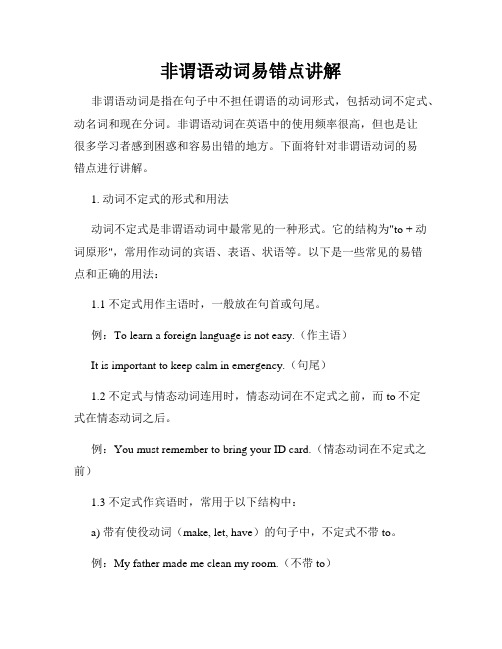
非谓语动词易错点讲解非谓语动词是指在句子中不担任谓语的动词形式,包括动词不定式、动名词和现在分词。
非谓语动词在英语中的使用频率很高,但也是让很多学习者感到困惑和容易出错的地方。
下面将针对非谓语动词的易错点进行讲解。
1. 动词不定式的形式和用法动词不定式是非谓语动词中最常见的一种形式。
它的结构为"to + 动词原形",常用作动词的宾语、表语、状语等。
以下是一些常见的易错点和正确的用法:1.1 不定式用作主语时,一般放在句首或句尾。
例:To learn a foreign language is not easy.(作主语)It is important to keep calm in emergency.(句尾)1.2 不定式与情态动词连用时,情态动词在不定式之前,而to不定式在情态动词之后。
例:You must remember to bring your ID card.(情态动词在不定式之前)1.3 不定式作宾语时,常用于以下结构中:a) 带有使役动词(make, let, have)的句子中,不定式不带to。
例:My father made me clean my room.(不带to)b) 动词感官(see, watch, hear)和感受(feel)后,不定式需带to。
例:I heard her sing in the competition.(带to)1.4 不定式作定语时,修饰名词或代词,位置在被修饰词之后。
例:I have a book to read.(修饰名词)The man to whom I spoke is my teacher.(修饰代词)2. 动名词的形式和用法动名词是以-ing结尾的非谓语动词形式,它可以作主语、宾语、表语、定语等。
以下是一些常见的易错点和正确的用法:2.1 动名词作主语时,谓语动词要用单数形式。
例:Swimming is my favorite hobby.(动名词作主语)2.2 动名词作宾语时,常常跟随某些动词(enjoy, avoid, finish, suggest等)之后。
语法填空之动词和非谓语动词易错点分析

例 2:The unmanned Chang’e-4 probe( 探 测 器 ) —the name was inspired by an ancient Chinese moon goddess— (touch) down last week in the South Pole-Aitken basin.(2020·全
{学科加油站}
·日积月累·
语法填空之动词和非谓语动词易错点分析
●江西省赣州市厚德外国语学校 黄连英
纵观近几年的高考英语试题,不难看出动词和非谓语 动词一直都是高考热点及难点。在 2021 年的 9 套高考英语 试题中,语法填空题里考查动词和非谓语动词的题目基本 上是 3~4 个,但由于动词时态、语态等用法的复杂性及非 谓语动词用法的灵活性,考生对这些题目易做出错误判断, 失分较多。笔者希望通过分析语法填空中动词和非谓语动词 的高频易错点,助力 2022 届考生备考。
【解析】句意:事实上,如今 60% 的衣物在购买一年之 后就被遗弃了……分析句子可知,abandon 与主语 clothing 为动宾关系,故用被动语态;clothing 为不可数名词,陈述 的是客观事实,要用一般现在时的单数形式,故答案为 is abandoned。
【易错点拨】英语主语和谓语动词在数方面的一致涉及 三个基本的指导原则:
例 7:Every sheet contained a poem or a joke and we looked forward to them (hand) out.
【错因】很多考生不清楚动名词的复合结构,无法判定 逻辑主语,导致误填 handing、handed 或 to be handed 等。
【解析】句意:“嫦娥”四号月球探测器――名字的灵感 来源于中国古代的嫦娥仙子――上周在南极 - 艾特肯盆地 软着陆。设空处是句子的谓语,根据时间状语“last week” 可知,应使用一般过去时,故填 touched。
非谓语动词易错点.doc
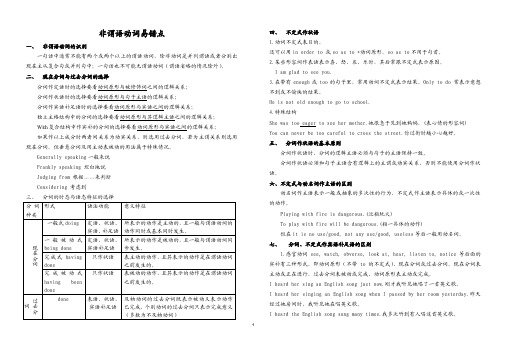
非谓语动词易错点一、非谓语动词的识别一句话中通常不能有两个或两个以上的谓语动词,除非动词是并列谓语或者分别出现在主从复合句或并列句中;一句话也不可能无谓语动词(谓语省略的情况除外)。
二、现在分词与过去分词的选择分词作定语时的选择要看动词原形与被修饰词之间的逻辑关系;分词作状语时的选择要看动词原形与句子主语的逻辑关系;分词作宾语补足语时的选择要看动词原形与宾语之间的逻辑关系;独立主格结构中的分词的选择要看动词原形与其逻辑主语之间的逻辑关系;With复合结构中作宾补的分词的选择要看动词原形与宾语之间的逻辑关系;如果作以上成分时两者间关系为动宾关系,则选用过去分词,若为主谓关系则选用现在分词。
但垂悬分词及用主动表被动的用法属于特殊情况。
Generally speaking一般来说Frankly speaking 坦白地说Judging from 根据……来判断Considering 考虑到三、分词的时态与语态特征的选择四、不定式作状语1.动词不定式表目的。
还可以用in order to 或so as to +动词原形。
so as to不用于句首。
2.某些形容词作表语表示喜、怒、哀、乐时,其后常跟不定式表示原因。
I am glad to see you.3.在带有enough或too的句子里,常用动词不定式表示结果。
Only to do 常表示意想不到或不愉快的结果。
He is not old enough to go to school.4.特殊结构She was too eager to see her mother.她很急于见到她妈妈。
(表心情的形容词) You can never be too careful to cross the street.你过街时越小心越好。
五、分词作状语的基本原则分词作状语时,分词的逻辑主语必须与句子的主语保持一致。
分词作状语必须和句子主语含有逻辑上的主谓或动宾关系,否则不能使用分词作状语。
非谓语动词的五大难点

非谓语动词的五大难点1. 须用省去to 的不定式(do)作宾补的11个动词。
五看(see、watch、notice、observe、look at)两听(hear、listen to)三使(make、let、have)一感觉(feel)根据谐音记忆法,我们可以记做“吾看两厅三室一感觉”。
例如:I saw a big bird fly over the roof of the house yesterday.昨天,我看到一只大鸟飞过了屋顶。
注意:以上11个动词,也可以接现在分词和过去分词作宾补,但在时间和语态上会有变化,我们以see为例来区分一下。
see sb. do sth. 看到某人做了某事see sb. doing sth. 看到某人正在做某事see sb./sth. done 看到某人/某物被......I see him make the phone call.我看到他打了电话。
(他打电话的整个动作我都看见了)I see him making a phone call.我看到他正在打电话。
(强调看到他正在打电话,并没有看见全过程.)We often see him surrounded by much work.我们常常看见他被大量的工作包围着.2.只接不定式(不能接动名词)作宾语的25个常用动词want、would like、wish、help、hope、learn、manage、offer、plan、afford、agree、arrange、ask、beg、care、choose、decide、demand、determine、expect、fear、prepare、pretend、promise、refuse3. 只接动名词(不能接不定式)作宾语的28个常用动词practice、consider、enjoy、finish、give up、imagine、keep、put off、risk、suggest、admit、advise、allow、appreciate、avoid、delay、deny、discuss、dislike、escape、excuse、fancy、forbid、mention、 mind、miss、permit、prohibit4. 既可接不定式也可接动名词,但含义完全不同的8个动词remember to do sth. 记住要做某事(未做) remember doing sth. 记得做过某事(已做)forget to do sth. 忘记去做某事(未做)forget doing sth. 忘记做过某事(已做)regret to do sth. 遗憾要做某事(未做) regret doing sth. 后悔/抱歉做过某事(已做)try to do sth. 努力做某事try doing sth. 尝试做某事mean to do sth. 计划做某事mean doing sth. 意味着做某事can’t help to do sth. 不能帮助做某事can’t help doing sth. 情不自禁做某事go on to do sth. 继续做另一件事go on doing sth. 继续做同一件事stop to do sth. 停下来去做另一件事stop doing sth. 停下正在做的事情5. 所有非谓语动词的完成形式都不能做定语,如to have done、to have been done、to have been doing、having done 和having been done。
非谓语动词总结以及易错点
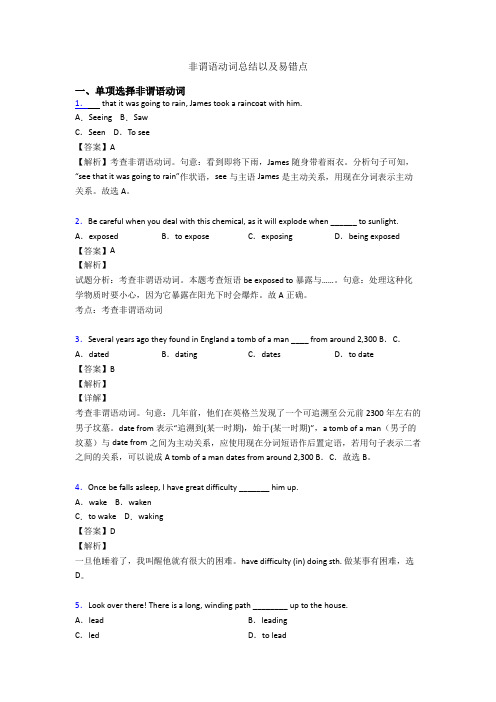
非谓语动词总结以及易错点一、单项选择非谓语动词1. that it was going to rain, James took a raincoat with him.A.Seeing B.SawC.Seen D.To see【答案】A【解析】考查非谓语动词。
句意:看到即将下雨,James随身带着雨衣。
分析句子可知,“see that it was going to rain”作状语,see与主语James是主动关系,用现在分词表示主动关系。
故选A。
2.Be careful when you deal with this chemical, as it will explode when ______ to sunlight. A.exposed B.to expose C.exposing D.being exposed【答案】A【解析】试题分析:考查非谓语动词。
本题考查短语be exposed to暴露与……。
句意:处理这种化学物质时要小心,因为它暴露在阳光下时会爆炸。
故A正确。
考点:考查非谓语动词3.Several years ago they found in England a tomb of a man ____ from around 2,300 B.C.A.dated B.dating C.dates D.to date【答案】B【解析】【详解】考查非谓语动词。
句意:几年前,他们在英格兰发现了一个可追溯至公元前2300年左右的男子坟墓。
date from表示“追溯到(某一时期),始于(某一时期)”,a tomb of a man(男子的坟墓)与date from之间为主动关系,应使用现在分词短语作后置定语,若用句子表示二者之间的关系,可以说成A tomb of a man dates from around 2,300 B.C.故选B。
4.Once be falls asleep, I have great difficulty _______ him up.A.wake B.wakenC.to wake D.waking【答案】D【解析】一旦他睡着了,我叫醒他就有很大的困难。
高中英语 非谓语动词疑点、难点复习

非谓语动词疑点、难点复习非谓语动词包括不定式(to do)、动名词(-ing)、现在分词(-ing)与过去分词(-ed)。
它们不受主语人称和数的限制,在句子中不能充当谓语,但可以充当句子的其他成分,并且有时态和语态的变化。
所以,要正确使用非谓语形式,一定要充分理解不同形式所表现的意义,要明确非谓语动词与逻辑主语之间是“主动”还是“被动(或状态)”,所表示的动作是“过去”、“现在”还是“将来”,以及和谓语动词所表示的动作是同步发生还是有先后之分。
一、不定式和动名词作主语1. 【翻译句子】哭是没有用的。
___________________________________________________ It is +no use, no good (fun, a great pleasure, a waste of time) doing sth.二、不定式和动名词作宾语2. 【例句观察】你介意我看下你的报纸吗?Do you mind my / me reading your paper?她不喜欢Mary那样说话。
She doesn't like Mary / Mary's talking that way.动名词作宾语时,可以带逻辑主语。
此时,带逻辑主语既可以是物主代词或名词的所有格,也可以是人称代词宾格和名词的普通格。
3. 【例句观察】I regret not having taken her advice. (not须放在having前)They couldn't stand being treated like that. 他们不能忍受被那样对待。
He decided to help me but I pretended to have finished my job.他决定帮助我但是我假装已经完成我的工作了。
作宾语的动名词和不定式除了一般式和主动式,还有完成式、被动式。
- 1、下载文档前请自行甄别文档内容的完整性,平台不提供额外的编辑、内容补充、找答案等附加服务。
- 2、"仅部分预览"的文档,不可在线预览部分如存在完整性等问题,可反馈申请退款(可完整预览的文档不适用该条件!)。
- 3、如文档侵犯您的权益,请联系客服反馈,我们会尽快为您处理(人工客服工作时间:9:00-18:30)。
必备英语【初中英语】非谓语动词难点、易错点一、非谓语动词1.In China, the most popular way of to school is by bike.A. getB. gettingC. getsD. to get【答案】B【解析】【分析】这题考查动名词做宾语的用法,the most popular way of doing sth“做某事的受欢迎的方式” ,of是介词,后面要接动名词做宾语,选B。
句意是:在中国,最受欢迎的上学的方式是骑车。
2.When you leave, please turn off the lights energy.A. saveB. to saveC. savingD. saved【答案】 B【解析】【分析】句意:当你离开时请关灯以节约能源。
动词不定式表示目的,结合句意,故选B。
3.I think AI (人工智能) in many fields will to help us solve many problems in the future.A. used, be usedB. is used, be usedC. used, useD. is used, use【答案】 A【解析】【分析】句意:我认为被用在许多领域的人工智能在将来将帮助我们解决许多问题。
AI是名词,___ in many fields做名词AI的定语,AI是动作use的承受着,并且句子是简单句,已经有谓语will,所以用动词过去分词作定语,即used,be used to do sth.被用来做某事,will是情态动词,所以be还是用原形be,故选A。
【点评】考查动词过去分词及固定搭配,注意平时识记,理解句意。
4. Though he often made his little sister ______, today he was made ______ by his little sister.A. cry; to cryB. crying; cryingC. cry; cryD. to cry; cry【答案】 A【解析】【分析】句意:虽然他经常使他的妹妹哭,但是今天他妹妹使他哭了。
使某人做某事: make sb do sth.后跟省to的不定式作宾语补足语,即前句填:cry,主动语态中省to的不定式,变为被动语态时,要用带to的不定式. 即后句填:to cry. 故选A。
5.It is wise ______Linda to make up her mind _______to play an instrument.A. for; learningB. for; to learnC. of; learningD. of; to learn【答案】 D【解析】【分析】句意:琳达下决心学弹乐器是明智的。
由句子结构可知,不定式作真正的主语,放在句末,用it作形式主语。
要用固定句型:It's + adj +for/of sb to do sth.前面的形容词来描述不定式时,要用介词for;形容词说明人时,要用介词of。
这里的形容词wise是形容人的性格特征的,要用It's + adj +of sb to do sth.,故选D。
【点评】考查固定句型It's + adj +for/of sb to do sth.的用法区别。
根据形容词的属性,选择正确的介词。
6.It was raining. My father asked me _______ a raincoat.A. takeB. takesC. tookD. to take【答案】 D【解析】【分析】句意:正下雨。
我父亲要我带上雨衣。
根据关键词 asked me,再结合选项,可判断出此处考查的是 ask sb. to do sth.的用法,故答案选 D。
【点评】考查固定搭配ask sb. to do sth.。
7.— Jane's spoken English is pretty good.— Yeah, she works hard and practices it both in and out of class.A. spokeB. to speakC. speaking【答案】 C【解析】【分析】考查非谓语动词的用法。
句意:--简的口语很好。
--是的,她工作很努力,在课堂上和课外经常练习。
短语practicedoing sth.练习做某事。
故选C。
8.Their parents don't allow them _______ in the river because it's really dangerous.A. swimB. swimmingC. to swimD. swam【答案】 C【解析】【分析】句意:他们的父母不允许他们在河里游泳,因为太危险了。
固定搭配allow sb. to do sth.,此处应用不定式。
故选C。
【点评】考查固定搭配allow sb. to do sth.9.We have worked so long. Shall we stop a rest?A. haveB. to havingC. havingD. to have【答案】 D【解析】【分析】考查非谓语动词。
句意:我们已经工作了很长时间。
我们停下来休息休息吗?stop doing sth停止做某事;stop to do sth停下来去做某事。
所以选D。
10.It is necessary for us students _____ the listening ability.A. to improveB. improvingC. improveD. improves【答案】A【解析】【分析】句意:对于我们学生来说提高听力能力是有必要的。
it's +形容词+for sb to do sth 做某事对于某人来说怎么样,故答案为A。
【点评】考查不定式。
掌握固定搭配it's +形容词+for sb to do sth。
11.People are supposed____________ hands when they meet for the first time in America.A. shakingB. to shakeC. shake【答案】 B【解析】【分析】句意:在美国,人们第一次相见的时候应握手。
A. shaking现在分词形式;B. to shake动词不定式; C. shake动词原形。
Be supposed to do sth应该做某事,为固定用法,故答案选B。
【点评】考查动词不定式,牢记固定搭配。
12.—I think the environment is terrible these years.—Yes, it will be even worse the government takes action it.A. until; protectB. unless; to protectC. if; protecting【答案】 B【解析】【分析】句意:——我认为这几年来环境太糟糕了。
——是的,环境会变得更糟糕,除非政府采取措施保护环境。
A. until; 直到…为止,B. unless除非,如果不,连词;C. if 如果,连词;until和if放在这里,句意不通顺,take action to do sth. 采取行动去做某事,动词不定式作目的状语,故选B。
【点评】此题考查连词短语和固定搭配。
13.—Do you have any plans for the holiday?—Yes, I'm planning to travel to Jiuzhaigou. I'm looking forward to the colourful lakesand amazing waterfalls.A. seeB. seeingC. seesD. saw【答案】 B【解析】【分析】句意:——你有度假的计划吗?——是的,我打算去九寨沟旅行。
我期待着看到五颜六色的湖泊和令人惊叹的瀑布。
look forward to+名词/代词/动名词,期盼......,see动词,要用动名词形式seeing,故选B。
【点评】考查固定搭配look forward to的用法。
注意接动词时要用动名词形式。
14.The boy _______ in the teachers' office was found _______ at the school gate yesterday.A. standing, smokingB. standing, to smokeC. stood, smokingD. stood, to smoke【答案】 B【解析】【分析】句意;站在老师办公室的这个男孩,昨天被发现在校门口吸烟。
现在分词作定语表示正在进行的伴随性动作,和被修饰词是主谓关系。
Find后接不带to的不定式做宾语补足语,但是当变为被动语态后,不定式符号to要加上,故选B。
【点评】非谓语动词的用法比较固定,区别的主要办法一是和被修饰词的关系。
一般现在分词和被修饰词是主谓关系,过去分词和被修饰词是动宾关系。
二是表示动作状态的不同,现在分词表示正在进行的伴随性动作,过去分词表示发生过的被动的动作,不定式表示具体的将要进行的动作。
掌握这两点,基本就能完成此类问题。
15.—Amazing news! The Shape of Water won four Oscars this March!—I just can't wait it in the cinema.A. to watchB. watchC. watchingD. to watching【答案】 A【解析】【分析】句意:—好消息!今年三月,《水形物语》赢得了四项奥斯卡奖!—我只是迫不及待地想在电影院看这部电影。
根据“短语can't wait to do sth.:迫不及待地做某事”,故选A。
【点评】考查固定搭配wait to do。
16.We must take action _________ waste water from running into rivers.A. keepB. keptC. to keepD. keeping【答案】 C【解析】【分析】句意:我们必须采取行动来防止污水流入河流。
keep… from阻止;take action采取行动;空格后的非谓语动词部分是表示采取行动的目的,所以应该用动词不定式,故选C。
